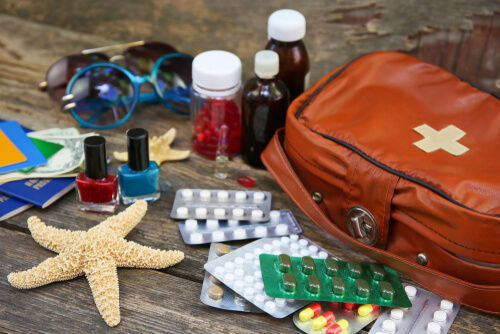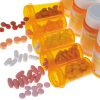- Empty cart.
- Continue Shopping
Tips for Traveling with Medication

Traveling can be an exciting and enriching experience, but it often comes with careful planning, especially when you need to take medications regularly. Whether you’re embarking on a short vacation or an extended journey, here are essential tips for traveling with medication to ensure a safe and stress-free trip.
1. Plan Ahead
Start early: Begin preparing for your trip at least a few weeks in advance. This allows you to gather all necessary documentation and ensure you have an adequate supply of medication for the entire trip.
Consult your healthcare provider: Before your trip, schedule a visit with your healthcare provider to discuss your travel plans. They can help you adjust your medication schedule if needed and provide extra prescriptions for emergencies.
2. Medication Documentation
Carry a doctor’s note: Request a letter from your healthcare provider that outlines your medical condition, lists your prescribed medications, and explains the necessity of carrying them while traveling. This can be invaluable in case of any questions or issues at airport security or customs.
Keep copies: Make photocopies or take pictures of your doctor’s note, prescriptions, and the medication packaging. Store these digital copies securely on your smartphone or in your email for easy access.
Translation: If traveling to a foreign country where language might be a barrier, consider having your doctor’s note translated into the local language or carry a translated medical summary.
3. Packing Medications
Original packaging: Keep your medications in their original, labeled containers. This helps identify the medication and dosage if needed.
Extra supply: Pack more medication than you anticipate needing in case your return is delayed or if you lose some. It’s advisable to have at least a few days’ extra supply.
Carry-on bag: Always keep your medications in your carry-on bag or personal item. This ensures that they are easily accessible during the flight and reduces the risk of loss or damage.
Cool storage: Some medications require refrigeration. If this applies to your medication, consider using a travel cooler pack with ice packs or gel packs. Ensure you know the specific temperature requirements and follow them diligently.
4. Security and Customs
Check regulations: Research the medication regulations and requirements of your destination, especially if you are traveling internationally. Some countries have strict rules about certain medications.
Carry prescriptions: Carry copies of your prescriptions for all medications. If you use a controlled substance, such as opioids, make sure you have the appropriate documentation.
Security screening: Inform security personnel about your medications before going through airport security. They may require additional screening or verification.
5. Time Zone Adjustments
Adjust your schedule: If your travel involves crossing multiple time zones, discuss with your healthcare provider how to adjust your medication schedule to accommodate the time difference.
Use alarms: Set alarms or reminders on your phone to ensure you take your medication at the correct local time during your trip.
6. Protect Against Theft or Loss
Separate storage: Split your medication supply between your carry-on bag and checked luggage. This way, if one bag is lost or stolen, you still have access to your medications.
Lock medications: Consider using a small lockbox or a medication organizer with a lock to secure your medications in your hotel room.
7. Travel Insurance
Review your policy: Check your travel insurance policy to ensure it covers the loss or theft of medications, as well as any medical emergencies that may arise.
8. Research Local Medical Resources
Know local healthcare options: Research medical facilities and pharmacies at your destination in case you need medical assistance or to refill your prescription.
Translation assistance: Carry a translation app or a phrasebook to help communicate your medical needs if you don’t speak the local language.
9. Stay Organized
Maintain a medication schedule: Stick to your regular medication schedule as closely as possible while traveling. Use medication organizers or smartphone apps to help you stay organized.
Keep it accessible: Store your medications in a convenient and easily accessible location in your carry-on bag or purse.
10. Dispose of Sharps Safely
If you use needles or syringes, carry a sharps container to safely dispose of used items. Check local regulations for proper disposal methods at your destination.
In Conclusion, Traveling with medication requires careful planning and organization, but it shouldn’t deter you from exploring the world. By following these tips and staying informed about local regulations, you can ensure that your medication needs are met while enjoying a safe and enjoyable journey. Always consult with your healthcare provider for personalized advice regarding your specific medication and travel plans.








